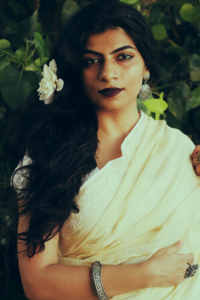Last October we had two full moons.
The turning seasons have brought us to another October, in a world that changes suddenly, like a hairpin turn on a mountain road.
In my time as an Otherwise Fellow, I have had the opportunity to reflect on process. On how the seasons turn, and how quickly things change. The support of the Fellowship has allowed me to return to a still centre in a shifting world, in which I return, for an ineffable reason, to create.
Support from the Fellowship has meant I have been able to sign up for online workshops and writing sprints led by more experienced writers. These spaces have provided invaluable, safe containers in which I have been able to work.
I have, while working on a longer project, submitted numerous short stories for publication. Of these, a portal fantasy derived from South Asian cultural histories has been accepted for publication at Strange Horizons, and a story based on the myth of Bonbibi – the Lady of the Forest – from the Sunderbans delta in Bengal, has been accepted by the Magazine of Fantasy and Science Fiction. In addition, a story set in the theatre world of 19th century Calcutta will appear in the anthology Speculative Futures, and my wonderful editors at Sword and Kettle Press have nominated my chapbook about shapeshifting werewolves in Bombay for an anthology of queer speculative fiction by Neon Hemlock Press.
I am hugely excited and buoyed by these acceptances. I am also excited to have begun a PhD degree in South Asian music history, with a special focus on gender and sexuality.
It has been a year of many difficult moons and bad seasons. A year of sunlit forests and seawaves illuminated by our many loves, our many lives. In my little life, it has been a year of joyful, painful, always sacred rediscovery. I am so grateful to the Otherwise Fellowship for believing in and supporting these attempts to refine and deepen my storytelling. I am so excited for the next batch of Fellows to continue the cycle.
May you receive the same warm support, generation after generation, so that we can continue to tell our stories.

